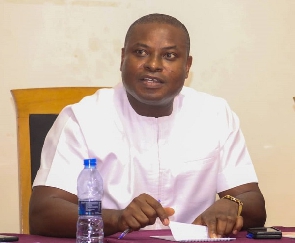 Richard Ahiagbah at a breakfast meeting with journalists in Ho
Richard Ahiagbah at a breakfast meeting with journalists in Ho
The National Communications Director of the ruling New Patriotic Party (NPP), Richard Ahiagbah has said the country's economy is always ugly under the leadership of the National Democratic Congress (NDC).
He explained that the NDC inherited a growing economy in 2009 but failed to manage it well and that led to a decline in the country's progression.
Ahiagbah mentioned this in Ho on Sunday, August 20, 2023, during a breakfast meeting with the press.
Richard said, "In 2009 when they (NDC) came to office they inherited a growing economy what were they able to do with that? They will tell you in 2011 they've achieved 14 percent GDP (Gross Domestic Product) growth yes that was on the back of the oil discovery that started production in 2010".
The communications director further explained that "2012,2013,2014 and 2015 the economy of 14 percent deteriorated to 13.6 percent, no other point after 2011 was the NDC able to grow past 40 percent which was on the back of oil".
Richard Ahiagbah, however, pronounced that "Any time the NDC is in power Ghana's economy does worse and anytime NPP is in power the economy grows".
He made references to the economy before the 2016 elections, saying "From 2011 to 2016 they (NDC) never grew the economy above what they've achieved but then immediately the management of the economy changed in 2017 this economy grew 8.2 percent from 3.4, just by merely changing those who are in charge from 2016 to 2017, we had almost about 5 percent growth".
Richard called on the media and party communicators to digest and disseminate accurate data as far as the economy is concerned to counter the NDC's assumptions that the NPP is not managing the country well.
Although Ghana sees slower economic growth in 2023, Finance Minister, Ken Ofori-Atta in the 2023 mid-year budget assured citizens of a pickup in the economy.